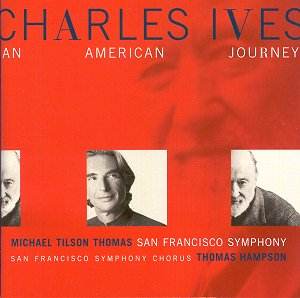This CD takes you on a fascinating journey indeed,
through the eclectic and at times bizarre imagination of America’s first
great pioneering composer and surely one of the great originals ever.
In Michael Tilson Thomas the music has a perfect advocate.
He recorded Ives’ Symphonies for Sony in the 1980s and has put on most
of Ives’ output regularly for over 20 years. It is apt therefore that
he should be at the helm. His choice of works here recorded live and
superbly captured in a brilliant acoustic is a mixture of the familiar
and the unfamiliar. In the first category we have ‘Three Places in New
England’; in the second, at least to me, the song ‘Charlie Rutlage’
- a cowboy song with quite an extraordinary sting in its middle!
If you are unfamiliar with Ives, let me indicate for
you a few signposts.
First he is, as I have come to realize now for some
years, a nostalgic composer. This is also pointed out in the fascinating
CD booklet notes by Jan Swafford. Practically all of his music has some
reminiscence of his childhood and upbringing. He lives in an impressionist
world where he can flit in and out of memories and reality in a mere
moment. His poem ‘Tom Sails Away' begins "Scenes from my childhood
are with me / I’m in the lot behind our house up on the hill".
Track 1 ‘From the Steeples and the Mountains’ is a
typical example of an Ives structure. Scored for brass and bells and
dating from 1901, it could be called an experiment in ‘quadrasonic’
sound. It starts almost imperceptibly with distant bells. The brass
enter, at first tentatively then increasing in contrapuntal intensity
and in volume so that the music reaches, after just three an a half
minutes, a massive climax and then disappears quickly leaving just an
echo behind. ‘The Unanswered Question’ has a similar plan. Quiet strings
enter, instead of the brass, then a single trumpet call asking the question
(what is the meaning of life?) a response from the woodwind, at first
gentle and then increasingly agitated reaching a climax thirty seconds
from the end and then collapsing into the bed of string harmonies, here
representing the unfathomable wisdom of God. This wonderful piece ends
the CD. A similar plan can be heard in the last of the ‘Three Places
in New England’ with its tumultuous climax. How good it is here to have
the chorus singing instead of the option of having their unison melody
played on cellos.
As to the performances I would mention ‘General William
Booth enters into heaven’ for chorus, baritone solo and orchestra. Quite
simply this is its best ever recording but there are some disappointing
moments. The speed could be steadier and the bass drum more emphatic
for "Booth led boldly with his BIG bass drum". Then, the baritone
soloist seems to be too closely microphoned which sometimes masks fascinating
orchestral detail for instance some slithery woodwind writing at, significantly,
"Walking lepers followed rank on rank".
‘The Circus Band’ must be a nightmare to record because,
for its last few pages, it seethes with detail. In the score a part
marked piccolo (sic) is actually texted. I have heard this part performed
by a baritone solo, which is quite fun but normally fairly inaudible.
The chorus should be congratulated here for their wonderful diction,
which cuts through the orchestral texture. ‘Serenity’ is a solo song,
certainly, but Tilson Thomas surely missed a trick here by not given
it to the unison chorus to sing; an option which Ives himself suggested.
This would have given it a more sonorous effect.
Ives was a deeply religious man and it is his experimental
Psalm settings that meant much to him. Psalm 100 is represented here
(what a pity there isn’t another one.) Collins Classics (now deleted)
recorded a disc of Ives’ Psalm settings (Collins 14792) and it is quickly
apparent that Ives’ beliefs permeate much of his music. Indeed he often
wrote his own words, as for example the anti-war poem ‘Tom sails away’
already mentioned. In the same category comes the foot-tapping ‘They
are there’ which takes the opposite view with its line "They are
fighting for the right? But when it comes to might/They are there".
In comparison with other recordings, there is, of course,
no other disc like this. If you want the ‘Three Places’ then you could
look at the Cleveland Orchestra under Dohnanyi (Decca 443 776-2) or
if you are mostly interested in ‘The Unanswered Question’ then you could
track down The Gulbenkian Orchestra under Swierczewski on Nimbus (NI
5316). But my advice is to snap up this recording and really enjoy yourself.
Gary Higginson


